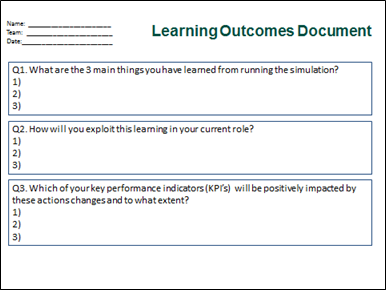
How do you get delegates to move beyond just being an “audience”at an experiential learning event and fully own their potential learning, behaviour changes and impact on job performance? In this article I summarise a practical 5-step process we have evolved, tested and found to be effective over a large number of business simulation game learning events.
Step 1: Initial briefing on Informal Learning We first need to explain how Informal Learning Works (see slide below).

We have developed an approach which we call “Formalised Informal Learning” which is about creating the best conditions for self-discovery learning based on structured and facilitated conversations about experiences gained playing a realistic team simulation game with colleagues.
Step 2: Self-reflection exercise and specific learning goals Once we have laid this foundation we find it helpful to immediately ask delegates to reflect on their own preferred informal learning techniques. What do they rely on the most? Are they missing any tricks by not having a valuable informal learning technique in their armoury? We then start to deal with the responsibility for learning piece by asking each delegate to identify at least 1 thing up front which they wish to gain from the learning event.
Step 3: Learning responsibilities, opportunities and value We need to make it very clear to the delegates that any learning and value they gain from the event will be in direct proportion to how hard they are prepared to work during the event. If they are there to be trained or entertained then this is all they will go away with! We find it helpful at this stage to introduce the Learning Outcomes Document (example template in the slide below). This is a living document that should progressively complete during the event when things are fresh. 
If delegates only start completing the Learning Outcomes Document at the end of the event they will lose about 50% of its value! A good LOD will have a number of revisions – things will be refined, added and removed as the event develops.
We also introduce the Learning Value Chain which can be expressed in different ways. For example:

The New Performance aspect is crucial and builds on Business Scorecard Theory. New Results tend to be financial outcomes which are what we want to capture however it can be quite meaningless to try to connect New Behaviours and New Habits directly to these results. New Behaviours have to be connected to New Performance in terms of Key Performance Indicators (KPIs) which then drive new financial and other results.
For example a new behaviour of more research before sales meetings should result in a higher percentage of follow-up meetings (KPI) which should result in higher sales won (End Result). The final part of this section is to clarify the different types of insight they may gain from the event
Planned Insights versus Serendipitous Insights
Serendipitous insights are the things which come up which are valuable but which your were not necessary looking for! These can be as useful as the planned learning you want to get from an event as part of the learning is discovering what you need to learn about in the first place.
Own Insights versus Others Insights
It has been said that everybody can learn from their own mistakes but only a wise person can learn from other people’s mistakes. It is a very costly and slow business having to learn everything by making your own mistakes first.
So a good goal is for each participant to come away with a "3-2-1":
- 3 Planned Insights
- 2 Shared Insight (gained from others)
- 1 Serendipitous Insights
At this point the delegates should be encouraged to extend their single planned learning objective to three. If people resist then make it clear that these are only provisional at this stage and can be changed and improved as the event develops.
Step 4: Encourage conversations, reflections and feedback during the team activities We now start the event and make sure that significant time is left at the end of each round for reflection and feedback. Initially the reflections should be more team-focused (We learned …) but as the event progresses they need to also become individually focused (I Learned…).
A great tool for helping this is a Learning Board for the event where teams and individuals can write their insights on sticky notes and endorse other people’s insights as they go along. Again this not something to be left to the very end or you will lose a lot of the value.
Step 5: Draw out the learning value chains and seek solid commitments As we come to the end of the event we need to bring everyone’s attention back to their Learning Outcomes document which should already have started to fill up. We need to help the delegates connect their insights to new or changed behaviours which drive important KPIs in their jobs and make commitments. This can open up a very useful conversation about the most important KPIs in the delegate’s jobs and how they drive value.
In our experience this is a great conversation for the participants to be in and leads naturally to a post event follow-up where the delegates share and finalise their Learning Outcomes Documents and make public commitments on them to their community and their managers.
You can read more about the detailed process we use to support this learning in A team game engagement process which guarantees transformative learning